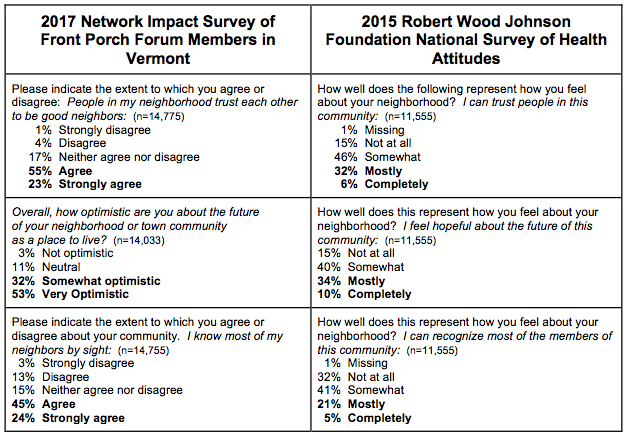Ghost of Midnight
… about neighbors, community and Front Porch Forum
New survey in Vermont reveals more trust among neighbors
Tapping 145,000 Front Porch Forum members across Vermont, a recent independent, large-scale survey revealed that FPF members know and trust their neighbors at double national averages. They also have more hope for the future of their local communities. More than 15,000 FPF members across Vermont responded to the survey.
78% of survey respondents say that their neighbors trust each other vs. 38% of Americans that say they trust their neighbors.
“It makes you proud to live in a place with such a strong sense of community.” • John in Panton
The new survey, conducted by Network Impact and supported by the Robert Wood Johnson Foundation, also found a similar pattern when asking related questions:
85% of survey respondents in Vermont are optimistic about the community where they live vs. 44% of Americans who feel hopeful about the future of their neighborhoods.
69% of survey respondents in Vermont know most of their neighbors vs. 26% of Americans who can recognize most of their neighbors.
“The recent survey shows that 89% of respondents say their neighbors help others, and 79% say that their neighbors pitch in on community projects. Being neighborly is paid forward in Vermont… to everyone’s benefit.” • Michael Wood-Lewis, Co-Founder and CEO of Front Porch Forum

This survey was commissioned by the Robert Wood Johnson Foundation and Front Porch Forum, and conducted by Network Impact. More than 15,000 FPF members (out of 132,000 surveyed) across Vermont responded in March 2017, yielding a 99% confidence level in the results. See here for Network Impact’s report about their survey.
Posted in: Civic Engagement, Community Building, Neighborhood
One comment
Leave a Reply
About Blog
Ghost of Midnight is an online journal about fostering community within neighborhoods, with a special focus on Front Porch Forum (FPF). My wife, Valerie, and I founded FPF in 2006... read more
Post Categories
- Uncategorized
- PDF2009
- Calendar
- Northeast Kingdom
- podcast
- Peer Rental
- Localization
- Big Tech
- Events
- PDF2007
- Web Traffic
- Google AdSense
- Pay It Forward
- Elections
- berkmansunlight
- Maps
- Video
- Upstate New York
- Coupons
- Wildlife
- Mobile
- Viral Marketing
- Raffle
- Crisis Response
- Donations
- Lost & Found
- Real Estate
- College Students
- Gratitude
- Social Responsibility
- Orton Family Foundation
- Start ups
- Make It Your Own Awards
- Online Civility
- Clay Shirky
- Newspapers
- Humor
- How To Use FPF
- Online Classified Ads
- Peer Reviews
- Best of FPF
- Politics
- Community Management
- Economic Development
- Local Reviews
- Case Foundation
- Borrow and Lend
- Neighborhood Watch
- Good Government
- Small Business Advertising
- Citizen Journalism
- e-Vermont
- Democracy
- Local Search
- Knight Foundation
- Burlington
- MacArthur Fellows
- Civic Engagement
- Social Media
- social capital
- Social Networking
- Vermont
- Neighborhood
- Community Building
- Local Online
- Front Porch Forum
[…] One problem with Steinmetz’s article is that she accepts the frame of all the blitzscaled platforms, which is that connecting the entire world online requires massively open platforms, unfortunately creating massive toxic effects. But cyberbullying isn’t, as Steinmetz writes, “a problem that crops up anywhere the people congregate online.” It’s a problem that crops up wherever a platform has been optimized for engagement over any other value, and where there is limited to no human moderation. For example, a user of Front Porch Forum in Vermont, where each instance is centered on a neighborhood of roughly 1000 households and a paid part-time moderator helps keep the conversation civil, does not experience cyberbullying, as a recent study found. […]